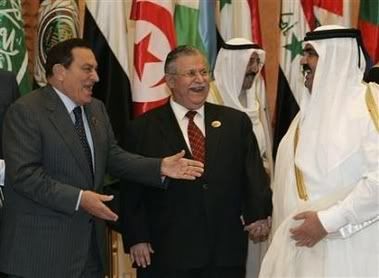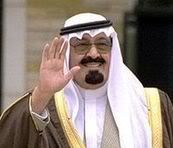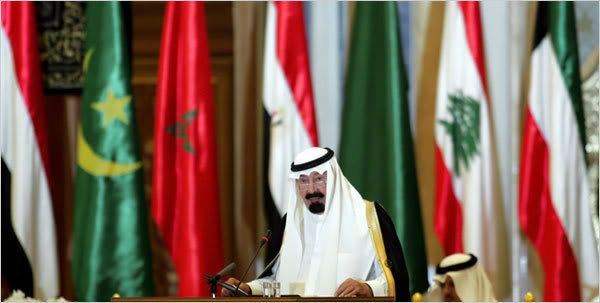
RIYADH, Saudi Arabia — King Abdullah of Saudi Arabia told Arab leaders on Wednesday that the American occupation of Iraq is “illegal,” and he warned that unless Arab governments settle their differences, foreign powers like the United States would continue to dictate the region’s politics.
The king’s speech, at the opening of the Arab League summit meeting here, underscored growing differences between Saudi Arabia and the Bush administration as the Saudis take on a greater regional leadership role, partly at American urging. The Saudis
seem to be emphasizing that they will not be beholden to the policies of their longtime ally.
The Saudis brokered a deal between the two main Palestinian factions last month but one that both Israel and the United States found deeply problematic because it added to the power of the radical group Hamas rather than to the more moderate Fatah. On Wednesday, the king called for an end to the international boycott of the new Palestinian government. The United States and Israel want the boycott continued.
In addition, King Abdullah invited President Mahmoud Ahmadinejad of Iran to Riyadh earlier this month while the Americans want him shunned. And in trying to settle the tensions in Lebanon, the Saudis seem willing to negotiate with Iran.
Last week, the Saudi king abruptly canceled his appearance at an April White House dinner planned in his honor, The Washington Post reported on Wednesday. The official reason given for the cancellation was a scheduling conflict.
Mustapha Hamarneh, director of the Center for Strategic Studies at the University of Jordan, said the Saudis are sending Washington a message. “They are telling the U.S. they need to listen to their allies rather than imposing decisions on them and always taking Israel’s side.”
In his speech on Wednesday, the king said: “In the beloved Iraq, the bloodshed is continuing under an illegal foreign occupation and detestable sectarianism. The blame should fall on us, the leaders of the Arab nation, with our ongoing differences, our refusal to walk the path of unity. All that has made the nation lose its confidence in us.”
King Abdullah has not publicly spoken so harshly about the American-led Iraq war before and his remarks suggested that his alliance with Washington may be less strong that Bush officials have been hoping.
Since last summer, the Bush administration has asserted that a realignment is occurring in the Middle East, one that groups Saudi Arabia, Egypt, Jordan and Lebanon along with Israel against Iran, Syria and the militiant groups that they back, Hezbollah of Lebanon and Hamas of the Palestinians.
The administration has urged Saudi Arabia to take a leading role in that realignment, but it is finding itself disappointed by the results.
Some here said the king’s speech was in fact a response to comments made by Secretary of State Condoleezza Rice on Monday calling on Arab governments to “begin reaching out to Israel.”
Many read Ms. Rice’s comments as suggesting that the Bush administration is backing away from its support for an Arab initiative aimed at solving the Israeli-Palestinian conflict. Israel wants the Arabs to make changes in the initiative, most notably in their call for a right of return for Palestinian refugees to what is today Israel. The Arab League is endorsing the peace initiative, first introduced by Saudi Arabia in 2002, without changes.
The plan calls on Israel to withdraw from all land it won in the 1967 war in exchange for full diplomatic relations with the Arab world. It also calls for a Palestinian state with East Jerusalem as its capital.
Regarding the Palestinians, the king said on Wednesday, "It has become necessary to end the unjust blockade imposed on the Palestinian people as soon as possible so that the peace process can move in an atmosphere far from oppression and force."
With regard to Iraq, the Saudis seem also to be paying attention to internal American politics. The Senate on Tuesday signaled support for legislation calling for a timeline for withdrawal from Iraq in exchange for further money for the war.
Last November, Saudi officials here realized that a Democratic upset could spell major changes for the region: a possible pullout from Iraq, fueling further instability and more important, allowing Iran to extend its influence in the region.
“I don’t think that the Saudi government has decided to distance itself from Bush just yet,” said Adel al-Toraifi, a columnist with close ties to the Saudi royal family. “But I also think that the Saudis have seen that the ball is moving into the court of the Democrats and they want to extend their hand to Speaker of the House Nancy Pelosi.”
Turki al-Rasheed, who runs a organization that promotes democracy in Saudi Arabia, said the king was “saying we may be moving on the same track, but our ends are different.”
“Bush wants to make it look like he is solving the problem, the king wants to actually solve the problems,” Mr. Rasheed said.
King Abdullah made clear that he looked forward to the day when American troops are gone because Arabs take care of their own problems: : “If confidence is restored, it will be accompanied by credibility, and if credibility is restored, then the winds of hope will blow and then we will never allow outside forces to define our future nor allow banners to be raised in Arab lands other than those of Arabism, brothers.”
The Saudis sought to enforce discipline on the two-day summit meeting, reminding Arab leaders and dignitaries to stay on message and leave here with some kind of solution in hand.
“The weight of the Saudis has ensured that this will be a problem-free summit,” said Ayman Safadi, editor in chief of the Jordanian daily Al Ghad. “Nobody is going to veer from the message and go against the Saudis. But that doesn’t mean the problems themselves will be solved.”
Secretary General Ban Ki-moon of the United Nations gave a stark assessment of the state of the Middle East in an address to the summit meeting, speaking in unsparing language that the region was “more complex, more fragile and more dangerous than it has been for a very long time.”
In Iraq, he said, “there is a shocking” daily loss of life, and Somalia is in the grip of “banditry, violence and clan rivalries.”
Iran, which was sanctioned by the Security Council for the second time last Saturday, is “forging ahead with its nuclear program heedless of regional and international concerns.”
Having spent Monday and Tuesday in Jerusalem and the West Bank, Mr. Ban urged the new Palestinian unity government to demonstrate a “true commitment to peace.”
In return, he said, Israel must cease its settlement activity and stop building the separation barrier.
He concluded, “Instability in the Arab League states is of profound significance to international peace and security.”
Reporting was contributed by Nada Bakri from Beirut, Lebanon; Rasheed Abou Alsamh from Jidda, Saudi Arabia, and Warren Hoge from Riyadh, Saudi Arabia.

Arabs warn of nuclear arms race
http://news.yahoo.com/s/nm/20070329/wl_nm/arabs_summit_dc_6
RIYADH (Reuters) - An Arab summit ended in Saudi Arabia on Thursday with endorsement for an Arab land-for-peace proposal with Israel and a warning about a possible nuclear arms race in the region.
"We affirm a just and comprehensive peace as a strategic option for the Arab nation in accordance with the Arab peace initiative that is the right path to a peaceful settlement of the Arab-Israeli conflict ... based on land-for-peace," Arab League Secretary General Amr Moussa said, reading out a statement.
The statement at the close of a two-day Arab League summit also warned of a nuclear arms race in the region, in an apparent reference to Israel and Iran, which is defying U.N. demands to halt its nuclear program.
"We also affirm the importance of emptying the region of all weapons of mass destruction ... and we warn of the launch of a grave and destructive nuclear arms race in the region," the statement said..
"We affirm the right of all countries to peaceful nuclear energy according to international standards and inspection systems."

Arab summit decisions to affect future of region-Saltanov
http://www.itar-tass.com/eng/level2.html?NewsID=11383384&PageNum=0
CAIRO, March 29 (Itar-Tass) - Russian president’s special envoy for the Middle East, Deputy Foreign Minister Alexander Saltanov who heads the Russian delegation at an inter-Arab summit in Saudi Arabia said on Wednesday that the adoption of serious political decisions at the inter-Arab summit underway in Riyadh will affect the future of the whole region.
“The situation in the region is extremely complicated, very many problems have aggravated and the adoption by the summit of serious political decisions aimed at the solution of all these issues will be of major importance,” Saltanov told Itar-Tass by telephone.
Arab commentators are giving much attention to the summit. May of them are of the view that the current summit is perhaps the most important over many years, because the region has never been on the brink of disaster to which it has now come. And if the Arab leaders fail to work out effective and viable decisions the consequences could be irreversible.
“Russia,” stressed Saltanov, “supports all positive, constructive undertakings of Arab states in the restoration of the Middle East peace process, Iraq settlement, preservation of national accord in Lebanon and in a number of other vital issues of the current Middle East situation.” According to him, the Russian delegation has brought to the summit a message from President Vladimir Putin “in which readiness is stressed to interact with Arab States in the search for sensible decisions, as well as the desire and readiness of Russia to develop relations on the bilateral and multilateral basis with the states of the region in different spheres.”
Along with the Arab peace plan that is aimed at the attainment of comprehensive settlement of the Arab-Israeli conflict, the League of Arab States (LAS) summit will make decision on Iraq. “This issue is being discussed,” said Saltanov, “and all Arab states are interested in the Iraqi crisis settlement, establishment of stability and security, advancing the political process and economic revival of the country.” The Russian deputy foreign minister pointed out that the common denominator for all summit participants is “the desire to preserve Iraq as a single, sovereign state having territorial integrity.”
Answering a question on new LAS resolutions on Iran Saltanov said that it is too early to speak about this.
The diplomat said as well that the Arab peace plan is a good foundation for further negotiating process in the Middle East and ensuring comprehensive settlement of the Arab-Israeli conflict.
Participants in the summit meeting of the LAS on Wednesday evening unanimously approved the second putting forward of the peace initiative that was adopted as the basis without any change. This is what was sought by the Arabs, although the issue of possible introduction of changes has been often raised in recent days so that Israel that is interested in certain corrections could accept this plan.
“The issue should be discussed if this are concessions or not concessions,” said Saltanov in a telephone interview with Itar-Tass from Riyadh. “To introduce changes or not is the decision of the Arabs, but basically, in the opinion of the majority in the international community, is that the initiative put forward in 2002 undoubtedly is a good basis for making compromise decisions that would result in the Arab-Israeli settlement,” according to Saltanov. The diplomat said, “Arab states are disposed towards practical implementation of the peace plan,” and an active discussion of different variants of its realisation are being discussed this way.
“On the whole, Arab countries seek the summit success and making coordinated decisions in the interests of stabilisation of the Middle East situation,” Saltanov pointed out. “Atmosphere was rather constructive at the meetings we took part in,” he noted.
The Saudi plan of settlement adopted five years ago as the common Arab initiative envisages Israel’s withdrawal from the Arab territories occupied in 1967, recognition by of an independent and sovereign Palestinian state on the West Bank of the River Jordan and in the Gaza Strip and ensuring fair settlement of the Palestinian refugees’ problem. In return, Arabs are ready to recognise the Jewish state, sign peace agreements with it and establish good relations.












![Brotherhood" (2006) [TV-Series]](http://photos1.blogger.com/x/blogger2/1421/379621144723082/211/z/425926/gse_multipart33129.jpg)







No comments:
Post a Comment